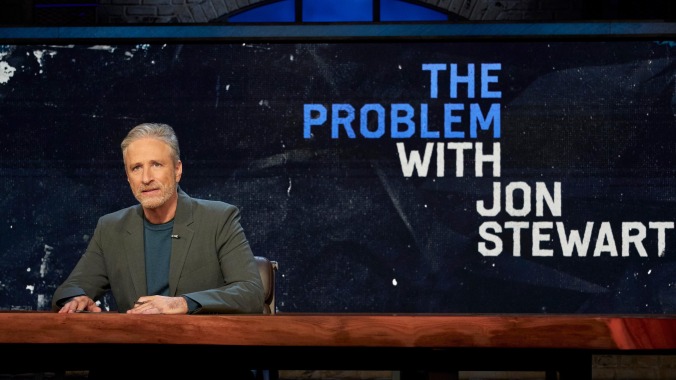Apple TV Plus no longer has a Problem With Jon Stewart
Citing "creative differences" over Stewart's coverage plans, the political talk show has been canceled

It was a cute gag when Apple TV+ chose to call its political talk show The Problem With Jon Stewart, since it sets up easy jokes like the one you see in the headline of this story and it was a nicely literal explanation of the show’s premise—former Daily Show host Jon Stewart talks through a specific Problem in the world today. Unfortunately, it turns out that Apple did have an actual problem with Jon Stewart, specifically in some of the topics he wanted to cover for the upcoming third season of the show. Now, that third season has been canceled altogether, just a few weeks before filming was supposed to begin.
This comes from The New York Times and was separately confirmed by The Hollywood Reporter, with the Times reporting that a source said Stewart told his staff today that planned episodes about China and artificial intelligence “were causing concern” among company executives, and given the fact that next year is another presidential election (Jesus, already?), “there was potential for further creative disagreements” between Stewart and executives.
Now, citing “creative differences,” the show will come to a rather unceremonious end, and even if you didn’t care about The Problem, this is a very clear illustration of why it’s bad when all of these companies take over more and more aspects of the cultural pipeline. China and AI shouldn’t really have anything to do with Stewart’s show, at least to the extent that it would be killed over topics like that, but Apple (the tech company) makes iPhones in China and Apple (the tech company) is spending “millions of dollars a day” training AI according to The Verge.
Apple TV+ (the streaming platform) is beholden to Apple (the tech company), which means tech concerns got tied up with the creative concerns, and Apple had to choose whether the creative freedom of the people making its TV shows was more important than its other business interests—and it evidently choose the depressing capitalist option, not that we should ever expect a major American company to do anything else… which brings us right back to “this is why it’s bad when one big company controls lots of stuff.”